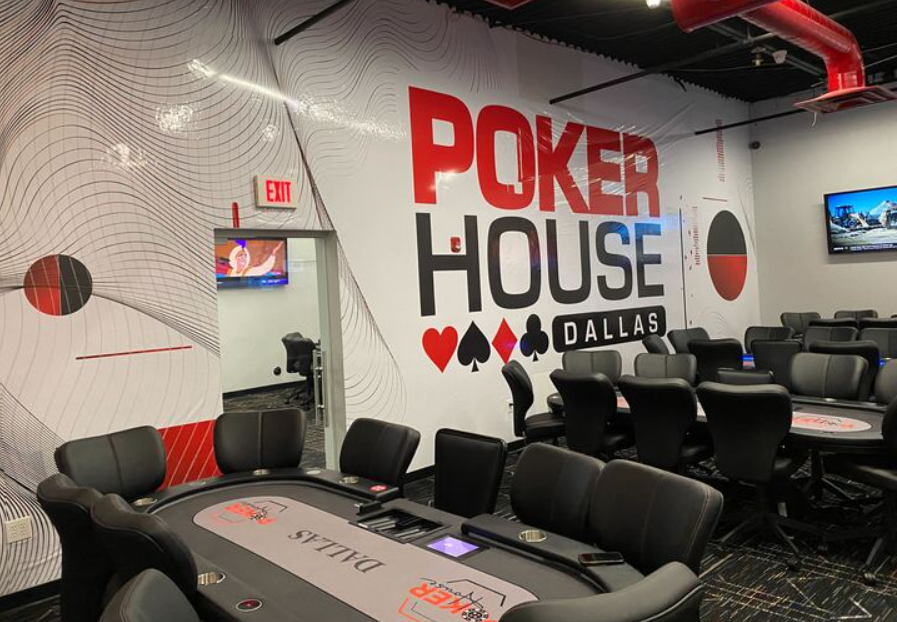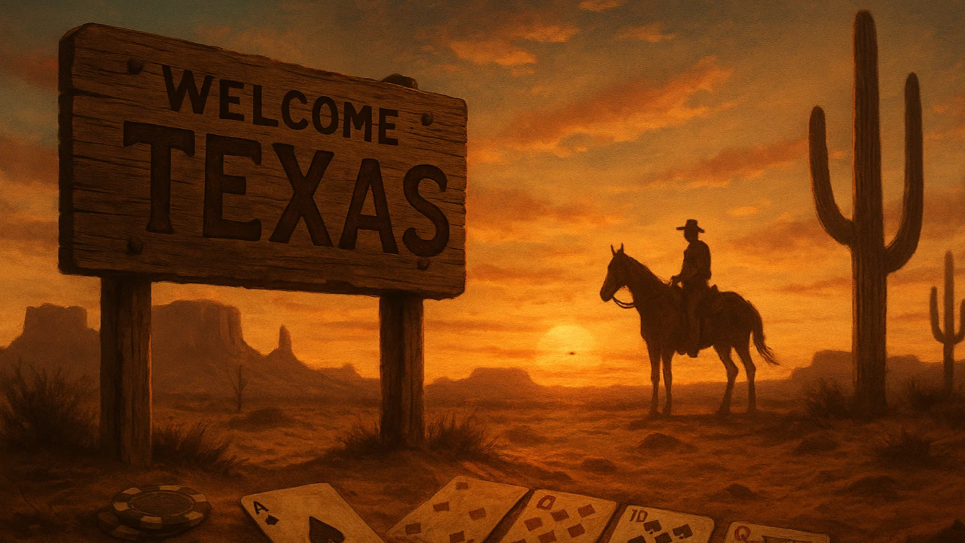Poker in Texas: From Wild West Roots to a Legal Gray Area
Poker has always been part of Texas’s cultural landscape. In the first half of the 20th century, it thrived in saloons and ranches—and it was from these smoke-filled rooms that legends like Doyle Brunson, Amarillo Slim, and Johnny Moss emerged, eventually making their reputations across the poker world. After all, Texas is the birthplace of Texas Hold’em, the variant that now dominates both Las Vegas and the global poker scene.
But despite this rich backstory, Texas chose a different path. In 1903, the state banned all forms of gambling, poker included. Today, the law only makes room for a narrow set of legal gambling activities: the Texas Lottery, pari-mutuel betting on horse and greyhound races, charitable raffles and bingo, and casinos operated by Native American tribes.

When Is Poker Legal in Texas?
According to Chapter 47 of the Texas Penal Code, gambling is a crime - unless you can tick all three boxes for what’s dubbed a “social game.” Poker is only legal in Texas if:
-
The game takes place in a private setting: This means a location not open to the general public without the host’s permission, typically a home or a private members-only space.
-
No one profits except from personal winnings: The host cannot charge entry, rake (a fee taken from the pot), or any other participation fee. The only money changing hands comes from actual poker winnings.
-
The game is fair for everyone: Every player has an equal shot, with no house edge or unfair advantage for anyone at the table.
If even one of these criteria goes unmet, the law defines it as illegal gambling.

How Do Poker Rooms Navigate the Law? Texas Clubs Get Creative
Strict as the rules may be, savvy operators have devised ways to stay within the letter of the law while still running poker rooms. The most prominent workaround has been the rise of so-called “membership clubs,” which technically don’t fit the definition of illegal gambling as written by Texas lawmakers.
1. Private Poker Clubs
These clubs operate as private organizations; you have to be a registered member to play. Their business model works like this:
-
The clubs take no rake - hey don’t skim a percentage from the pot in cash games
-
Instead, they charge a fee for time or membership, for example, $10 an hour for a seat rental, or a monthly membership fee
-
Only members can enter - walk-ins from the public are not allowed
This setup allows clubs to meet the law’s technical requirements: the location is private, the operator doesn’t profit from the actual play, and everyone at the table is on equal footing when it comes to winning.

Of course, even this seemingly simple model can get tricky. How the law is interpreted differs wildly from one city and one sheriff’s office to another. What’s considered legal in Austin and has operated openly for years could be shut down in Houston for “illegal business activity.” Cities like Dallas and San Antonio have their own takes on the statutes, and some clubs have been forced to close despite meticulously following the rules.
Case in point: Dallas officials initially gave the green light to Texas Card House, only to later revoke its permit, triggering a legal fight. Similar stories have played out in other cities, with clubs getting shut down despite prior official approval. This legal uncertainty creates constant anxiety not just for club operators, but also for players who want to find a safe, legal place to play.
2. Home Games
Another option is private home games, often taking place among friends or acquaintances. These are legal as long as no exception to the law is breached - not even once.
If, however, a home game becomes a regular event and the host starts making money from running it, it becomes illegal gambling in the eyes of Texas law.

3. Casino Cruises: Poker on Open Water
Perhaps the most creative solution Texan poker fans devised is to move the action to places where state laws don’t apply - away from Texas shores and out to sea. Starting in the late 1980s, casino cruise ships set sail from ports like Galveston, Port Aransas, Corpus Christi, and Freeport. The vessels would venture past the 12-mile limit, where neither federal nor state gambling rules applied. Once in international waters, the slots would light up, the cards were shuffled, and - naturally - Texas Hold’em tables opened.
Initially, ships on these cruises would have to “sail to a foreign port” - at least on paper - even if they never actually got there. Later, that requirement was dropped, but a 1948 federal law still called for either visiting a foreign port or remaining out for at least 24 hours, a rule that doomed many startup ventures before they could take off.
Famous Casino Cruisers and Their Fates
-
Le Mistral (1988–1992): Sailed from Port Isabel “to Mexico,” but ended in bankruptcy
-
Texas Treasure (1999–2008): The most famous of the bunch, the ship moved operations from Port Aransas to Palm Beach, before heading home for a final run
-
Aransas Queen Casino / Jacks or Better (2015–2018): The last attempt to revive the model, with the boat eventually relocated to Georgia
4. Illegal Games
Where the law doesn’t provide clear, enforceable options, illegal poker rooms fill the gap, sometimes attracting criminal elements and opening the door to violence and other dangers. There have been multiple reports of robberies and violent incidents linked to underground poker games in Texas.
The Texas Paradox
Texas Hold’em may well be synonymous with Texas, but in its home state the game is still under siege. Despite this, poker continues to find its way to those who love it. It’s a testament to the game’s enduring appeal - even the toughest restrictions can’t quash the spirit of Hold’em.
Ultimately, whether or not poker will be legalized in Texas goes far beyond gambling - it’s a clash of culture, morality, business, and history. And as the law holds firm, players just keep finding new ways to keep the soul of Texas Hold’em alive.
Sources: Sora, Wikipedia, PokerNews, Upswing Poker





